Run The Series: HALLOWEEN
A brisk run-through of all 13 films in the undying HALLOWEEN franchise.
HALLOWEEN (1978)
★★★★½
In 1978, on Halloween night, Michael Myers committed a collection of crimes of such cold, inhumanely clinical brutality, that his very actions splintered and broke apart reality itself into multiple different timelines, branching off from the ambiguous horrors of that one dark night, each world trying to ascribe reasons to his madness.
In one reality, Michael turned out to be Laurie Strode's brother, compelled to kill everyone in his bloodline by an ancient Druid curse rooted in Halloween's pagan origins, resulting in him going on an undying quest to kill his sister, her daughter Jamie, and eventually his own son, all the while he was aided, abetted, and protected by a cult lurking in every dark corner of Haddonfield, shaping events to their occult whims.
In another reality, there was no cult, no curse, no son of Michael, no daughter of Laurie, and no nights of terror beyond that one night of Michael's infamous rampage that seemingly ended with an explosion in Haddonfield Hospital, whereafter Laurie Strode spent 20 years waiting for her psychopathic brother to return for her, or for her son, even if she moved thousands of miles away, and even if she changed her name, because of course she never truly saw him die, and if he wasn't dead, of course he was going to return to find his sister.
And in another reality still, Michael was never Laurie's brother, and he was caught almost immediately after inexplicably surviving six bullets to the chest, living in an insane asylum for 40 years, whilst Laurie spent those four decades raising a family, conceiving a daughter named Karen, who begat a granddaughter named Allyson, and who both would become estranged from Laurie through her trauma turning her into a paranoid survivalist hermit, preparing in minute detail for the night when that horrific stranger Michael Myers would eventually escape, and maybe come back to finish the job.
There's also the reality where Michael Myers only exists in a slasher film called Halloween that plays on TV in between commercials for Silver Shamrock Halloween masks, the reality where he hijacks an internet reality TV show with his murderous hijinks before getting high-kicked by Busta Rhymes, and the reality where Michael was the progeny of abusive trailer trash parents in a world where everyone is awful and annoying and drops F-bombs every other word, but those corners of the Michael Myers multiverse are for another day…
HALLOWEEN II (1981)
★★★½
I don’t have much to say about Halloween II, to be honest. (Oh, sorry, let me clarify: the first of the multiple Halloween II’s that there’s been by this point, seeing as Rob Zombie’s Halloween II, and Halloween (2018) are also the second entries in their respective disarticulated continuities.)
Directed by Rick Rosenthal, written by Debra Hill and an unenthused John Carpenter - the latter of whom infamously wrote his contributions to the script while three sheets to the wind, sat at his typewriter, drunk off his ass on beer, trying to squeeze narrative blood from the stone of his original film’s standalone story so as to make this sequel he’d had no intention to do - and with a returning Jamie Lee Curtis, this Halloween II is a solid enough slasher. Trading out Carpenter’s original widescreen anamorphic compositions, and gliding Steadicam technical mastery, for a more anonymous but competent nuts-and-bolts construction, Rosenthal doesn’t have quite the same knack for suspense as Carpenter boasted in the previous film, but he does make his first (and best) Halloween stint in the director’s chair count for something by way of giving Halloween II a kind of giallo Italian horror flair to its depictions of violence, and the darkly dreamlike atmosphere conjured within the film’s primary hospital setting.
This is also notable for its naive-but-laudable attempt to definitively end the Michael Myers/Laurie Strode story once and for all, so as to pave way for Carpenter and Hill’s conception for Halloween to become an anthology series of standalone films after this, beginning with Season of the Witch. But as we know the history to have panned out, this was not to be, because audiences hated Season of the Witch for daring to be about anything other than Michael Myers, and most of all, because executive producer/rights-holder Moustapha Akkad knew a golden goose when he saw one, and so saw fit to make it an eternal contractural stipulation that Michael Myers could never permanently die, allowing the Akkad estate to resurrect Michael and reboot the franchise as many times as they want, in perpetuity.
Still, at least they tried to kill the boogeyman…
HALLOWEEN III: SEASON OF THE WITCH (1982)
★★★★½
Halloween III: Season of the Witch fucking rules, and I’m sorry for those who can’t get onboard with its delicious Goosebumps-for-grownups vibes. It’s not a Michael Myers story, nor was it intended to be, and maybe if they hadn’t added the “III” to the title, audiences wouldn’t have gotten the false impression this was to be a continuation of The Shape saga, and so could have enjoyed the film for what it actually was, rather than what they thought it should be.
John Carpenter and Alan Howarth’s score is freakin’ awesome, and has aged like fine wine. Tommy Lee Wallace’s direction and visual style is, in my opinion, of a better quality than Rick Rosenthal’s had been. The sci-fi/occult horror storyline is objectively bonkers, yet told with such conviction, and peppered with plenty of mystery, tension, gruesome violence, and characters you care about surviving the absurd-yet-horrifying conspiracy they’re ensnared within, that it just works. And most of all, the ending has such an apocalyptic intensity, and potent satirical meta-ness to it, that you could draw a straight line from Season of the Witch directly to Carpenter’s later work in They Live, and In the Mouth of Madness, not to mention the blend of science fiction and occultism absolutely being of a piece with his underrated Prince of Darkness.
Silver Shamrock Shake, anyone?
HALLOWEEN 4: THE RETURN OF MICHAEL MYERS (1988)
★★★½
Halloween III was a misunderstood gem that nonetheless flopped critically and commercially, so fuck it, we ball without Carpenter or Curtis, we use the magic of retconning to bring Michael Myers and Dr. Loomis back from the dead, and we give Michael a new mask that totally sucks!
But hey, at least Halloween 4 gives Donald Pleasance more opportunities to devour the scenery, and it marked the introduction of Jamie Lloyd as played by Danielle Harris, delivering one of the greatest child actor performances ever put to screen.
This also tries out the Michael-makes-Haddonfield-turn-into-a-crazy-mob thing that Halloween Kills pitifully replicated 33 years later, and did infinitely worse than Halloween 4, which at least had the good sense to keep it a minor subplot, rather than some misguided sociopolitical commentary bullshit the encompasses the whole story.
Plus, that cliffhanger ending! So bananas, yet so dark and so promising! Imagine the places the next film could take it!
Oh, wait… the next film is from the director of Omen IV: The Awakening, which means we’re like a dead cod at a fishmongers’ - totally boned.
HALLOWEEN 5: THE REVENGE OF MICHAEL MYERS (1989)
★½
Halloween 5 abandons the ending of Halloween 4 entirely, retcons it into irrelevance, then adds a whole bunch of extra dumbshit tedious wank that makes you want to bash your head against the nearest, brickiest wall.
It’s overly glum, yet obnoxiously goofy (what with the literal fucking cartoon sound effects that follow the bumbling idiot cops around, a decision on par with the stupidity of the slide whistle during the car corkscrew stunt in The Man with the Golden Gun, or the hokey comedy music following the cops’ antics in Wes Craven’s original The Last House on the Left). It sidelines Jamie Lloyd to a sinful degree, even while Danielle Harris acts her little heart out as one of the only redeeming qualities the film has to offer. It spends what feels like eons of excruciatingly insufferable screen time following the annoying Tina and her annoying friends, whom I was genuinely begging Michael to hurry up and kill already. And in its expanding dependence on the supernatural and the Cult of Thorn avenues this era of Halloween sequels went down, things just get too silly and convoluted to enjoy.
But hey, what else would you expect from Dominique Othenin-Girard, the estimably talentless hack director who brought us another horror franchise’s nadir in the form of Omen IV: The Awakening…?
HALLOWEEN: THE CURSE OF MICHAEL MYERS (1995)
(Theatrical Cut)
★★
Well, it’s better than Halloween 5, but merely by a hair.
Otherwise, the theatrical cut of Halloween: The Curse of Michael Myers is a colossal clusterfuck of outside interference (mostly from real-life monsters, the Weinstein brothers), extensive rewrites and reshoots, silly supernatural lore a million miles removed from the blissful simplicity of the first film’s premise, egregious editing that slashes at your eyes like the razor blade in Un Chien Andalou, overbearing sound design that never allows for atmospheric breathing room, a bafflingly awful version of the score in the hastily reshot third act that relies on guffaw-inducing electric guitars making whinnying sounds like horses on cocaine, and a finale that is, without exaggeration, utterly fucking incomprehensible. In this excessively compromised form, the film is frankly an insult to Donald Pleasance’s memory, and to the dedicated work he put in to what would be his final performance before his death.
(Producer’s Cut)
★★★½
With regards to Halloween 6: The Curse of Michael Myers, the Producer’s Cut supersedes the Theatrical Cut in the same ways that Justice League’s Snyder Cut is superior to the Theatrical Whedon Cut, or the SpiceDiver fan-made Extended Cut of David Lynch’s Dune is a major improvement over the Theatrical Cut - i.e. it’s quite a bit longer, so much more coherent, filled with tons of vital scenes and moments that should never have been left on the cutting room floor, and even though it ultimately remains deeply flawed due to being built on fundamentally unsound foundations, thanks to its notoriously troubled production, and major studio meddling after the fact, this substantially different alternative cut is nonetheless a thousand times more engrossing and interesting than what was originally officially released in theatres in the first place.
Sure, in Halloween 6’s case, it is kind of a bummer that the Producer’s Cut doesn’t keep the bit where Michael Myers electrocutes a dude so hard that the dude’s head explodes - (so stupid, so awesome) - but if that’s the trade off for getting a version of the film with more screen time for Donald Pleasance’s final performance providing a moving gravitas to ground the objectively ridiculous plot… more weight given to the last appearance of the character of Jamie Lloyd (even if it’s still sans Danielle Harris, who adamantly deserved better, especially since she went to the trouble of emancipating herself from her parents in order to work on the film, before she was then unceremoniously cast aside and recast)… more of a subtle gothic atmosphere that dispenses with the theatrical cut’s irritating over-reliant abundance of hacky Vine boom sound effects… none of that seizure-inducing flashy MTV music video editing scorching your retinas… and a whole other completely different, low-key version of the score by Alan Howath that ditches the weird, horribly dated, unintentionally hilarious guitar wailing he employed for the theatrical cut’s retooled third act…
…well, I think all those improvements are worth the loss of one goofily fun and gory death scene that you could look up on YouTube anyway.
HALLOWEEN H20: 20 YEARS LATER (1998)
★★★★
Laurie Strode and Jamie Lee Curtis are back back back, baby! And all it took was pruning the existence of the continuity set by the fourth, fifth, and sixth films, banishing them to the Shadow Realm (or more appropriately, the Void from the MCU, where errant timelines and characters from a fictional multiverse are discarded and abandoned when they’re no longer profitable), and establishing a new timeline built from the aftermath of Halloween II’s conclusion 17 years prior.
To my tastes, Halloween H20: 20 Years Later feels like the first great Halloween film since the first one. I may not have seen it in my youth during the time when I was growing up with the Scream series, but thanks to the story and screenplay being heavily worked on by Scream scribe Kevin Williamson, and H20’s general glossy 90’s sheen that fills me with nostalgic comfort, it feels as familiar to me as an old warm blanket. H20 feels like it gets everything right that it needs to. It’s witty, dramatic, suspenseful, violent, moving, respectful of its past, and a deeply satisfying ending to the trilogy it made by bridging itself to the first two films, and ignoring the rest. (One wishes that Jamie Lloyd could’ve remained a part of this timeline, as was originally planned by Williamson, but it makes sense why they’d want a simpler, cleaner break from the Cult of Thorn era, leaving this reboot without the baggage of sequel homework for audiences to need to catch up on.)
If Curtis could’ve had her way, this would have been the ideal place for Halloween to end, for realsies this time.
But that darn contract, and the whims of Akkad that everyone had to abide by, meant that capitalistic compromise superseded artistic integrity, to the surprise of no one…
HALLOWEEN: RESURRECTION (2002)
★
A godforsaken embarassment.
A trend-chasing cringefest from out-of-touch producers trying to make Michael Myers hip for a new generation, plonking him in the middle of a stupid plot involving reality TV, the internet, an out of place Tyra Banks, and a performance from Busta Rhymes that’s as entertaining as it is emblematic of the whole film’s eye-rolling schlockiness. (“Trick or treat, motherfucker!”)
That it’s directed by Rick Rosenthal, who had acquitted himself decently 21 years earlier with his work in Halloween II, makes it all the sadder.
The only reason that Resurrection isn’t the worst of the worst in the Halloween series for me is because there are some neat moments of Michael-centric suspense and unsettling imagery (usually involving the tension from the primitive digital cameras seeing things the characters don’t) that Rosenthal has the wherewithal to sprinkle in among the bullshit, and some of the film is so-bad-it’s-good, and more than anything, I just hate Halloween Kills far, far more.
Rob Zombie’s HALLOWEEN (2007)
★★★½
Out of all the films in the Halloween oeuvre, the controversial Rob Zombie entries were the ones I expected to like the least.
But as it turns out, once I got on the wavelength of what Zombie was doing with his grittier remix of the Myers-verse’s various details, they actually succeeded in winning me over.
That’s not to say I don’t have nitpicks with his approach to certain aspects. The dialogue he writes for the teenage characters interacting with each other often sounds like an old man’s uneducated guess at how the youth might talk. The rampant unpleasantness of most of the characters isn’t fun to wallow in. The elimination of mysterious ambiguity to Michael’s upbringing can feel apocryphal and antithetical to the dark intrigue of his erstwhile formless Shape of a character, and Zombie’s addition of simplistic nature-versus-nurture psychological insight to explain why Michael does what he does, may rub die-hard Halloween fans the wrong way. Worst of all, his insistence in the Director’s Cut, of including the sequence where the adult Michael escapes captivity because his guards are too busy sexually assaulting a female inmate, is a misstep for reasons of needless nasty exploitation, and also for omitting the Theatrical Cut’s much better alternative where Michael escapes his bonds during a prisoner cell transfer, by overpowering the multiple guards who were doing everything in their power to smartly outnumber him, and usher him from one place to the other whilst being rightfully wary of his huge size, and unpredictable demeanour. Zombie’s preferred notion of Michael getting free due to the negligence of a couple of sadistic rapist hicks is just the worst choice to me. If one were to cut together a happy medium of the best parts from both cuts of the film, Halloween (2007) might be worth bumping up to four stars. But that’s for the fan-edits to decide, while we focus on the official cuts Zombie signed off on.
Where Zombie got me on side with his vision was in the unforgiving, harsh, bloodily brutal viscerality of the violence, depicted with a relentless, upsetting realism, befitting the post-9/11 swathe of horror movies that mirrored the bleakness and terror of the times by making their violence filthier, grungier, and photorealistic in a way that matched the uncensored horrors people were seeing on the news, and online, every day. The old Halloween films kept their acts of carnage at a kind of cognitive remove by way of either being minimally bloody, or so over-the-top in their gore that you were reassured by their movie fakery. Zombie’s films wrest that cinematic sheen away from the violence, to make it feel unsparingly ugly and true, along with its impact on others made a distressing reality you can’t avoid. The violence is purposefully intensified to meet the demands of the Saw and Hostel era, but Zombie doesn’t do this for its own needlessly gratuitous sake. Consider the deeply haunting scene of the now-adult Danielle Harris playing a new version of Annie Brackett, the friend of Scout Taylor-Compton’s new version of Laurie Strode, where a vulnerably half-naked, blood-drenched Harris keeps screaming Laurie’s name in bone-shaking fright and ear-piercing volume, trying to warn her friend that they’re not alone, but too paralysed with the shock from her injuries and the fear of the monster only she knows is there to say anything more eloquent or explanatory, so left reduced to her desperate, pleading screams assaulting the sinister quiet, like when you cry out in a nightmare to warn someone of a danger they can’t see, yet nobody can hear you. But we can hear Annie, and it is chilling.
Rob Zombie’s HALLOWEEN II (2009)
★★★½
Rob Zombie’s Halloween II - vastly different in virtually every way from 1981’s Halloween II - may be even further mired in a reputation for audience division over its quality, or lack thereof depending on who you ask, than his first go round in twisting Halloween lore into weird, grisly, uniquely Zombie-esque new shapes. Zombie himself didn’t want to make it, didn’t enjoy making it, and went on to practically disown it after the fact, mostly thanks to the endless meddlings he endured from the goddamn Weinsteins, operating under the horror-focused Dimension Films division of Miramax.
Yet despite everything going against it, Zombie’s Halloween II has collated a passionate cult following of fans who see it as his - and the entire Halloween saga’s - equivalent to David Lynch’s Twin Peaks: Fire Walk With Me.
Surviving the events of the first Zombie Halloween, Taylor-Compton’s Laurie is akin to the Laura Palmer we see in Fire Walk With Me. Beset by post-traumatic stress, plagued by portentous visions of doom, her ailing mental health and self-destructive spiral of addiction to curb the pain only alienating her from everyone she knows, this Laurie feels as trapped by her demons and circumstances as Laura did hers, all the while these monstrous beings of unstoppable evil are on their way to claim the lives and souls of both girls. The films even share the ominous symbolism of a white horse!
Now, while I wouldn’t say Zombie’s Halloween II is anywhere near as good as Lynch’s film (especially since Zombie’s style is a lot more abrasive in how hard it hits you over the head with what it’s talking about), I do think his Halloween II is a bold, fascinating, praiseworthy reinterpretation of what a Halloween movie can do, or be. More effectively done so here than with the various subversive choices made by the equally risk-taking Halloween Ends thirteen years later. For at least Zombie’s Halloween II made me feel genuinely moved by some of the turns it takes, helped in no small part by the performances from the always-stellar Danielle Harris, and the always-fantastic Brad Dourif, the latter of whom walks away with the whole movie, thanks to an exceptionally powerful scene that sees him deliver the single biggest gut-punch of profoundly devastating emotion seen in the entire franchise, period.
David Gordon Green’s HALLOWEEN (2018)
★★★★
[Originally written on October 24th 2018,
during its theatrical release.]
If it weren't for those few slightly stodgy plot points, those sporadic spots of iffy pacing, those frustrating intrusions of tension-sapping scenes of bad comedic improv, and those last couple of minutes feeling a smidge too rushed to feel completely satisfying (which I guess bodes well for the inevitable sequel that's gonna come sooner or later thanks to the solid reviews and sterling box office returns)...
...to be honest, there was a good long stretch of this new Halloween where it was doing so many things right with what it was doing with the fabric of the Michael Myers-verse, and what it was doing with its status as a decades-removed follow-up to its original predecessor (erasing every other Halloween sequel, reboot, and remake from the series cannon entirely), where I was seriously thinking that Halloween (2018) might be becoming the Blade Runner 2049 of horror movie sequels.
By which I mean:
That, or any one of those other sequels from 2017 - i.e. Logan, or Star Wars: The Last Jedi, or Twin Peaks: The Return - which returned to their franchises with fourth wall-skirting, lightly meta, mightily poignant stories exploring the ache of nostalgia, and indirectly interrogating the very notion of sequels, alongside meditations on the past being allowed to corrupt the present and future, the healing and destructive effects of time itself, and old age turning old heroes into weary, haunted husks of their younger selves.
(See here: Jamie Lee Curtis as Laurie Strode, JLC portraying the now much elder, much more richly-characterised Laurie with a blunt ferocity, uneasy unpredictability, and emotional fragility that is captivating to behold every second she's on screen.)
In retrospect, though, I've realised that such a statement (as in, the Blade Runner 2049 comparison) is too grand a pronouncement to make of Halloween (2018)'s pretty-flawed-but-pretty-great overall quality.
Not to mention that a more apt comparison to conjunct Halloween with is with two other fellow well-regarded 2018 horror stories, Hereditary, and The Haunting of Hill House; that is to say, these three being horror tales heavily concerned with familial legacy, familial trauma, and familial fears spreading from one generation to another.
(Though make no mistake, Halloween (2018) is about 20,000 leagues away in quality and scariness from either Hereditary or The Haunting of Hill House, sooooo... take all that as you will.)
But even with all of its occasional weird, idiosyncratic quirks - both interesting, and infuriating - Halloween (2018) still successfully stakes its claim as one of the best horror movie sequels ever made.
(Yes, I'm aware that that's not really saying much, considering just how precious few examples of such a thing exist within the genre, but still!)
Put simply, I cannot help but commend the film-makers for their ambition, their attention to the details that make a (good) Halloween movie a (good) Halloween movie, their achievement in artfully crafting genuine heart-pounding suspense and wince-inducingly brutal violence, and their commitment to (and pulling off of) actually making Michael Myers something he hasn't been in the 40 years since John Carpenter created him:
TRULY EVIL.
TRULY SCARY.
And TRULY THE SHAPE.
Oh, and if you can just intravenously pump that new absolutely fucking boss!! soundtrack by John Carpenter, his son Cody Carpenter, and his godson Daniel Davies (son of Dave Davies from The Kinks!), directly into my veins? That'd be greatttttttt...
HALLOWEEN KILLS (2021)
★
Halloween Kills doesn't exist.
In this David Gordon Green retroactive continuity that forgoes every other sequel, and any of the divisive efforts of Rob Zombie, there's just Halloween (1978), then Halloween (2018), and THAT'S IT.
Just like there's no season 9 of Scrubs, no seasons 5-8 of Dexter, no seasons 7-8 of Game of Thrones, no episodes between Episode 9 and Episode 22 in season two of Twin Peaks, and no war in Ba Sing Se, there is - and I cannot stress this enough - NO HALLOWEEN KILLS, OKAY?!
HALLOWEEN ENDS (2022)
★★★
I have been putting off Halloween Ends for two years.
So burned was I by just how inordinately fucking shit Halloween Kills turned out to be, that I was loathe to let David Gordon Green hoodwink me into parting with my money or my time again. Matters were doubly not helped by the harshly polarised reaction to his trilogy’s conclusion, Halloween Ends, and the perturbing revelation that it had been falsely marketed to conveniently exclude the fact that the film was actually inexplicably focused on some new rando character called Corey, rather than on Laurie or Michael Myers. These factors sent my intention to watch the film for myself steeply rocketing to the bottom of my list of priorities.
But this Halloween-focused instalment of Run The Series wouldn’t be a comprehensive overview if I ignored it, nor would my completist compulsions be satisfied if I neglected to watch the only Halloween movie left for me to see out of the 13 entries the franchise has produced to date. So, with gritted teeth, guarded expectations, and an active Netflix subscription for once, I’ve finally checked out Halloween Ends with my own eyes, aaaaaand…
…I didn’t hate it.
Not that I’d go so far as to say it’s an under-appreciated, subversively masterful act of secret genius for sidestepping what audiences anticipated from it, thus making it one of the best sequels in the series. I know there are defenders of the film who’ve been in its corner from day one, arguing such a thing to anyone who cares to listen. My praise is a little more muted than that.
As a concept, the idea of Michael’s evil influence existing like an infection (a favourite word the film uses often) beyond his physical presence, contagiously rotting the collective psyche of the town of Haddonfield, is fascinating, and certainly explored better in Ends than it was in the putrid manure fire of Kills. Having the Christine-inspired character of Corey Cunningham be transformed from good to evil by the town’s despicable residents, by the hinted pre-existing abuse of his mother, and by encountering Michael himself - the patient zero for evil’s pathogenic spread in the community - is an intriguing, thought provoking prospect. It’s just in the overall execution of these ideas, and Green’s usual flawed attempts at communicating them coherently and subtly, that I start to run into problems.
There’s also the annoying insistence this trilogy has on continuing not to commit to whether there is or isn’t a supernatural aspect to Michael and his impact on Haddonfield. His resilient imperviousness to serious injury, him gaining his inhuman strength both from killing people, and from the fear his killings brew in the hearts of others, and that perplexing moment in the sewer when Michael and Corey lock eyes, and some kind of psychic transference seems to occur between them (“the abyss gazes also into you”, which the film takes pains to quote later on to ensure you get the point), all seem to maybe suggest there is some degree of supernaturalism afoot. Yet it never feels like this uncertainty is born from a deliberate desire for ambiguity to invoke unease, but rather like Green and his writers want to have their cake and eat it too. They want Michael to be scary because he’s just a man who kills for the sake of killing, but they also want him to be a vessel for what’s implied to be nigh-on Lovecraftian depths of infectious evil that makes others evil by proxy.
It reminds me of a show that used to be on in the UK on ITV, called Whitechapel, which began as a murder mystery regarding a Jack The Ripper copycat, and then as the series progressed, with different cases every couple of episodes, it gradually became more and more clear that something paranormally evil had to be informing the bizarre crimes that were going on. But the show never committed to following it through to that conclusion. It frequently behaved as though at any moment, the Whitechapel setting would be revealed to have been built atop a Buffy-esque Hellmouth all along, giving a cause for the spooky goings-on that had eluded explanations rooted in reality… only they never did, and the show got cancelled before they had the balls to go through with it!
Anyway, all this to say that Halloween Ends thankfully didn’t piss me off anywhere remotely as much as Halloween Kills did. I appreciate the big swing at doing something interestingly different with the series, without completely embarrassing itself in the attempt. It doesn’t feel quite as satisfying an ending to one of these timelines in the Halloween multiverse, compared to the more cathartically complete endings granted by Halloween H20, or even Halloween (2018) (that by all rights they should’ve left well enough alone as a perfectly fitting finale… except, of course, money supersedes art, same as it ever was). But I will give it to Halloween Ends for at least trying to be about more than just a Laurie vs Michael fight night smackdown, and more than just Michael going on another rote killing spree in formulaic fashion. It doesn’t always work, but the change of pace to become more of a character drama about the ways we respond to horrific events that happen to us - be it through forgiveness and evolution, despair and resignation, or vengeance and retaliation that sees us become the very evil we wanted to avoid - is something that feels legitimately meaningful, and much more competently handled thematically than it was in the insurmountably stupid film that came before.
It’s not the end of the franchise - not by a long shot, for as long as there’s money to be made off of Michael Myers’ back, this IP will never be allowed to die - but as the title promises, it is at least an ending.





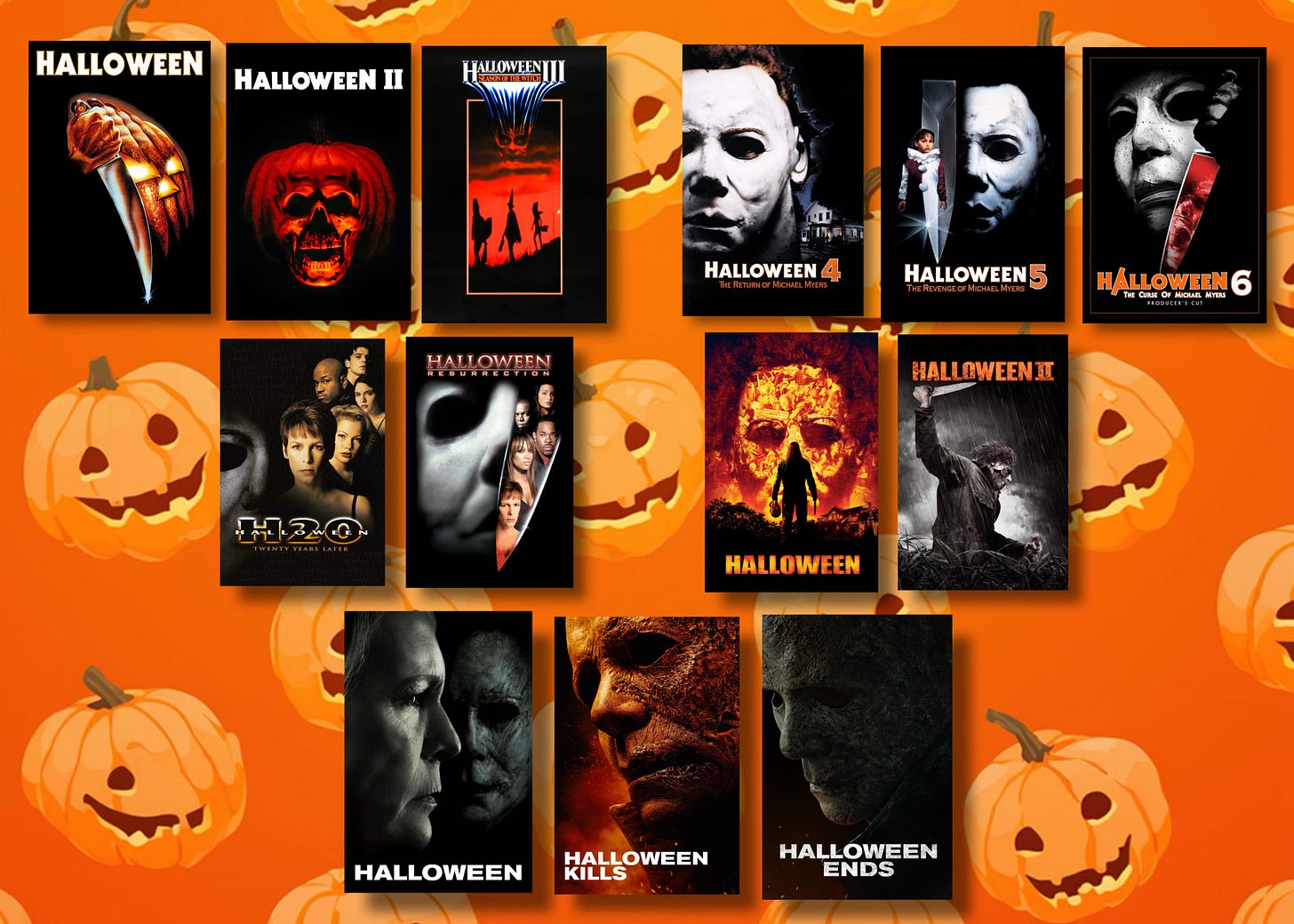
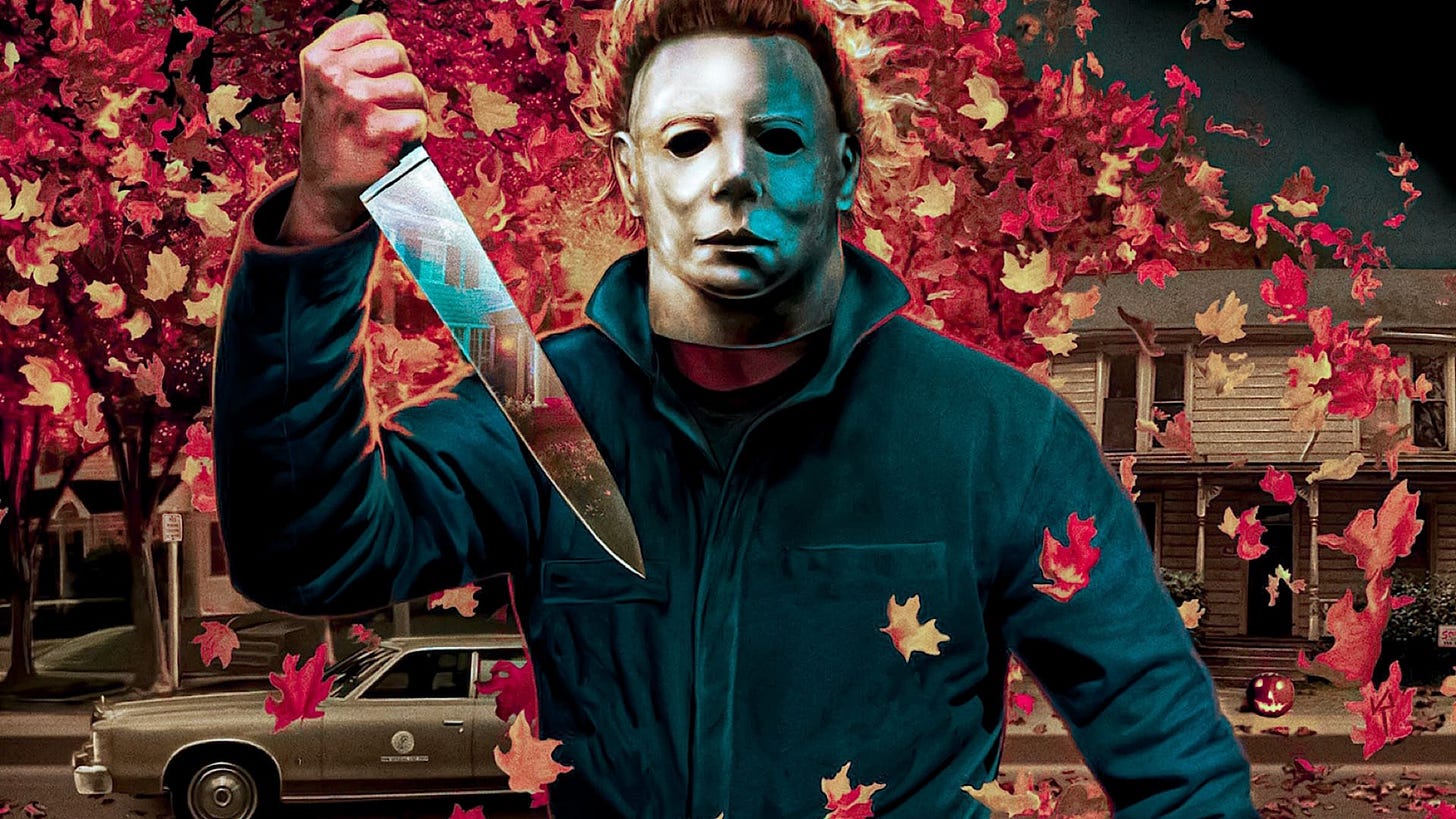
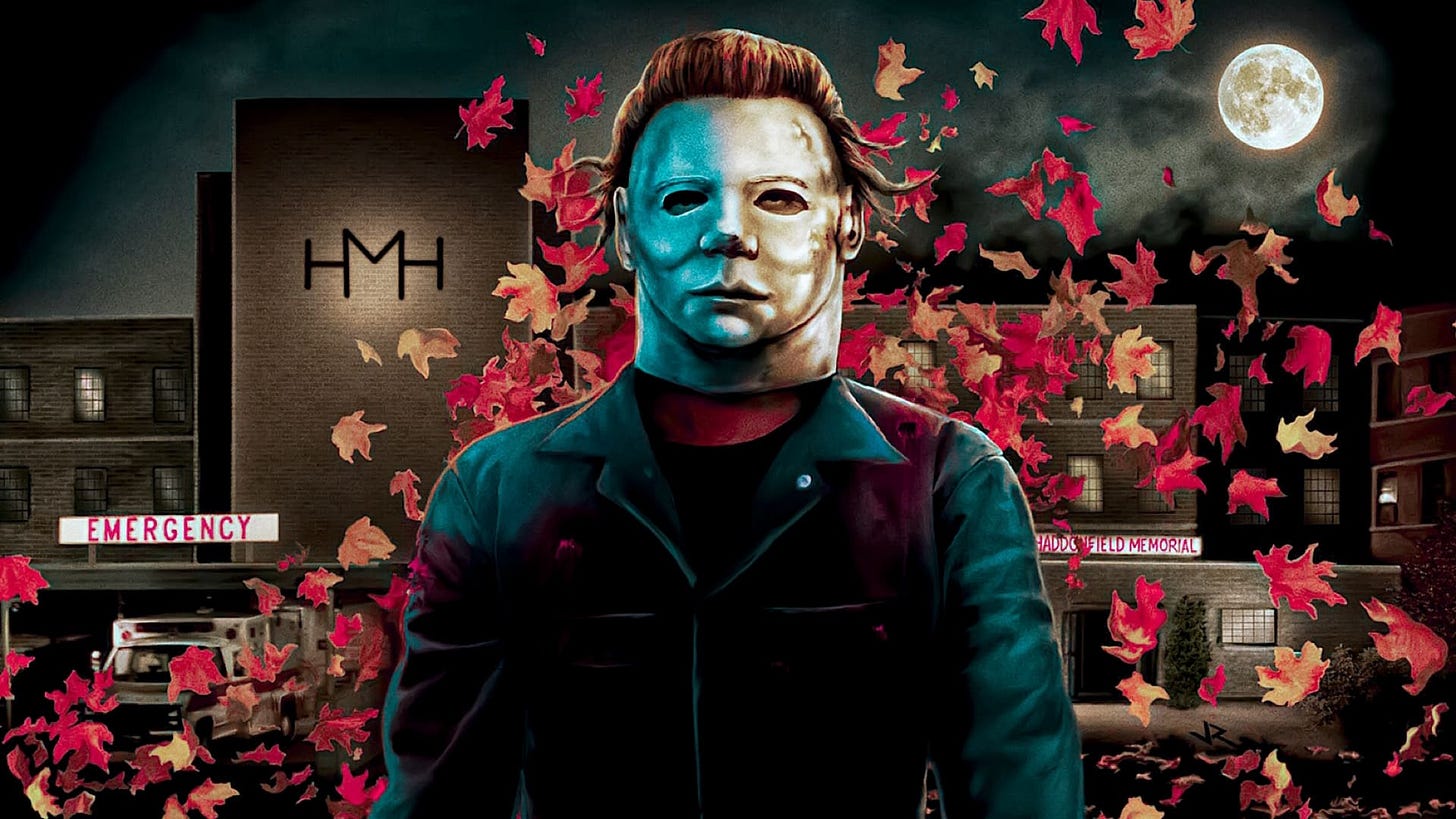
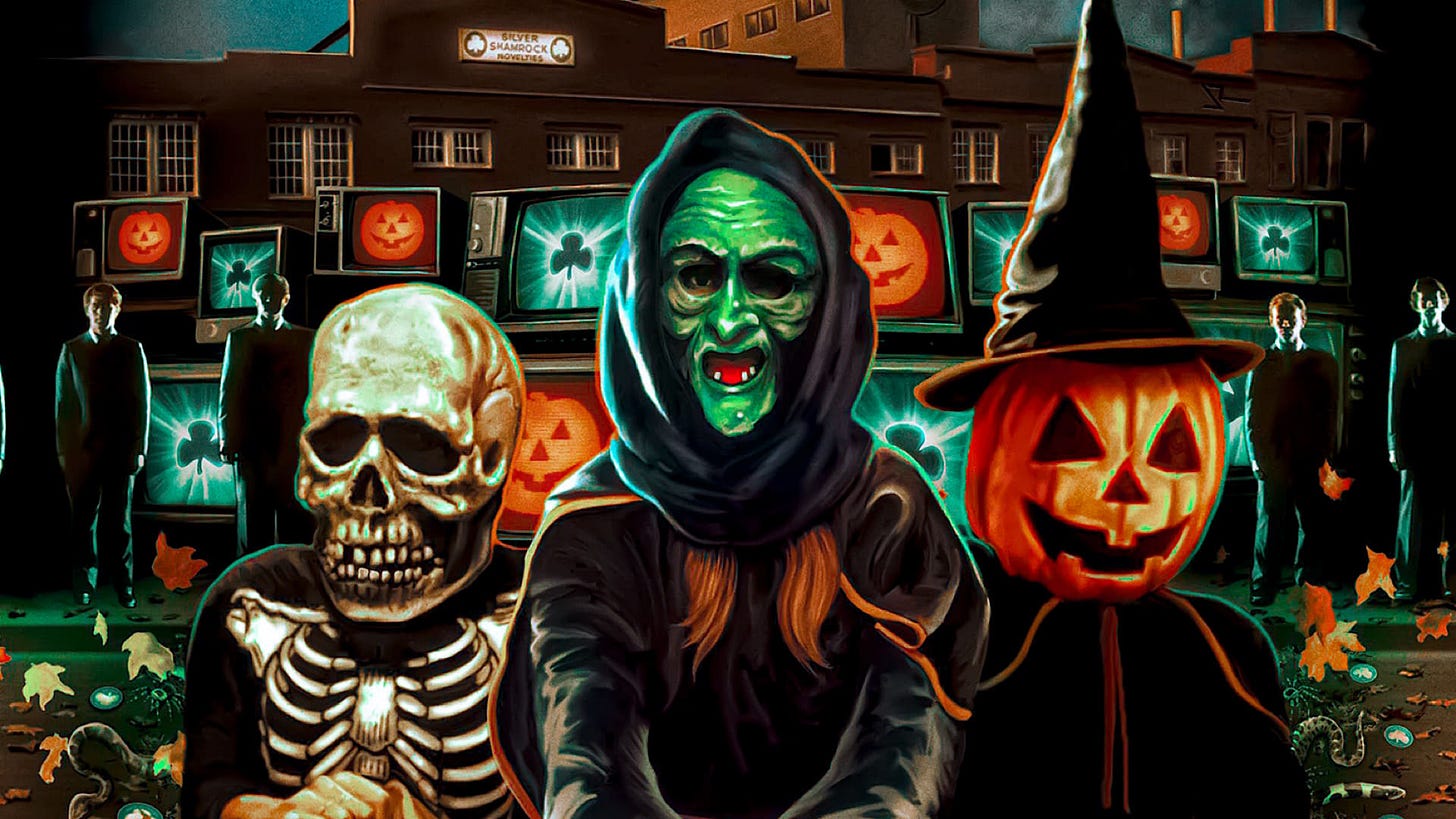
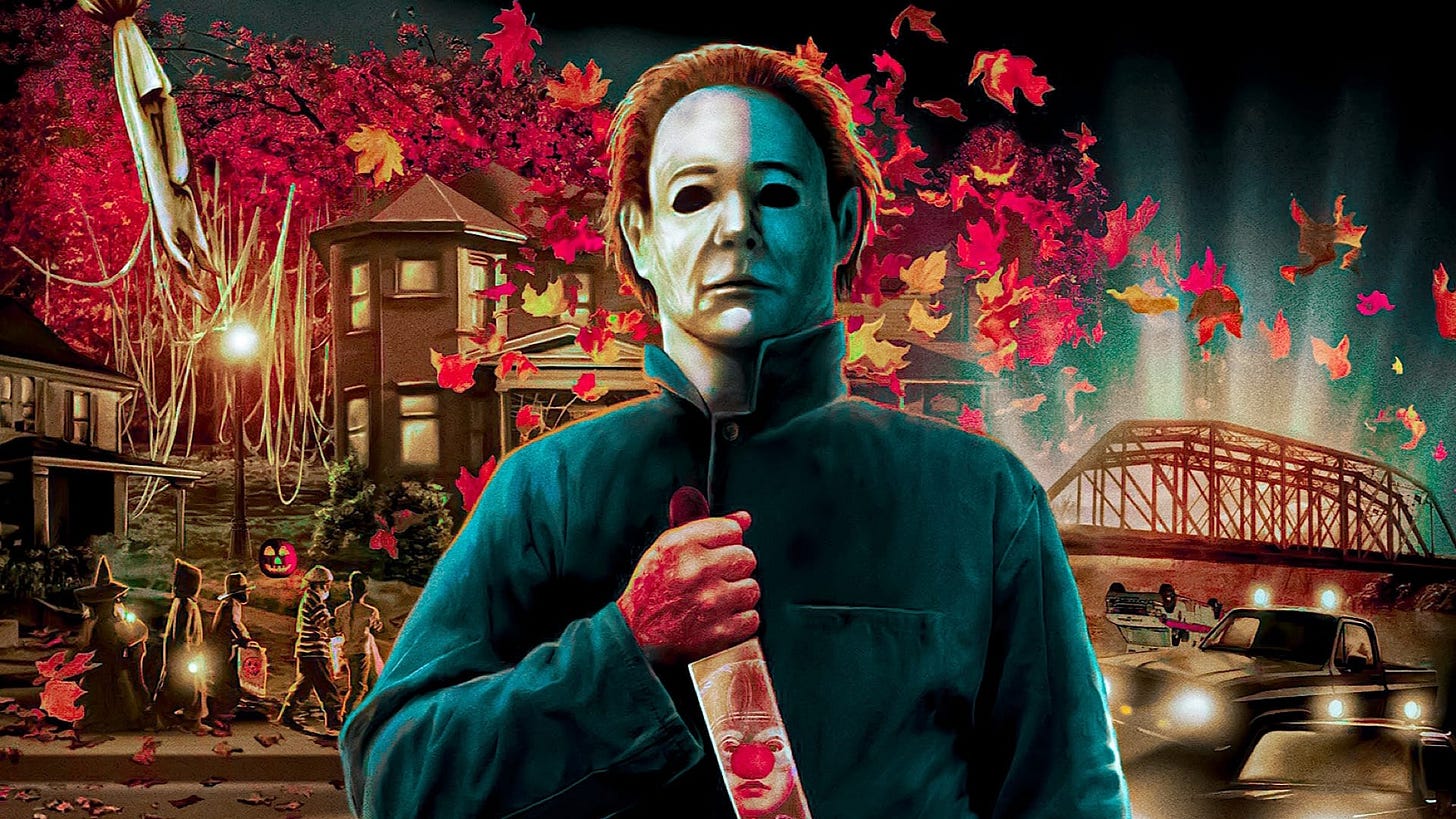
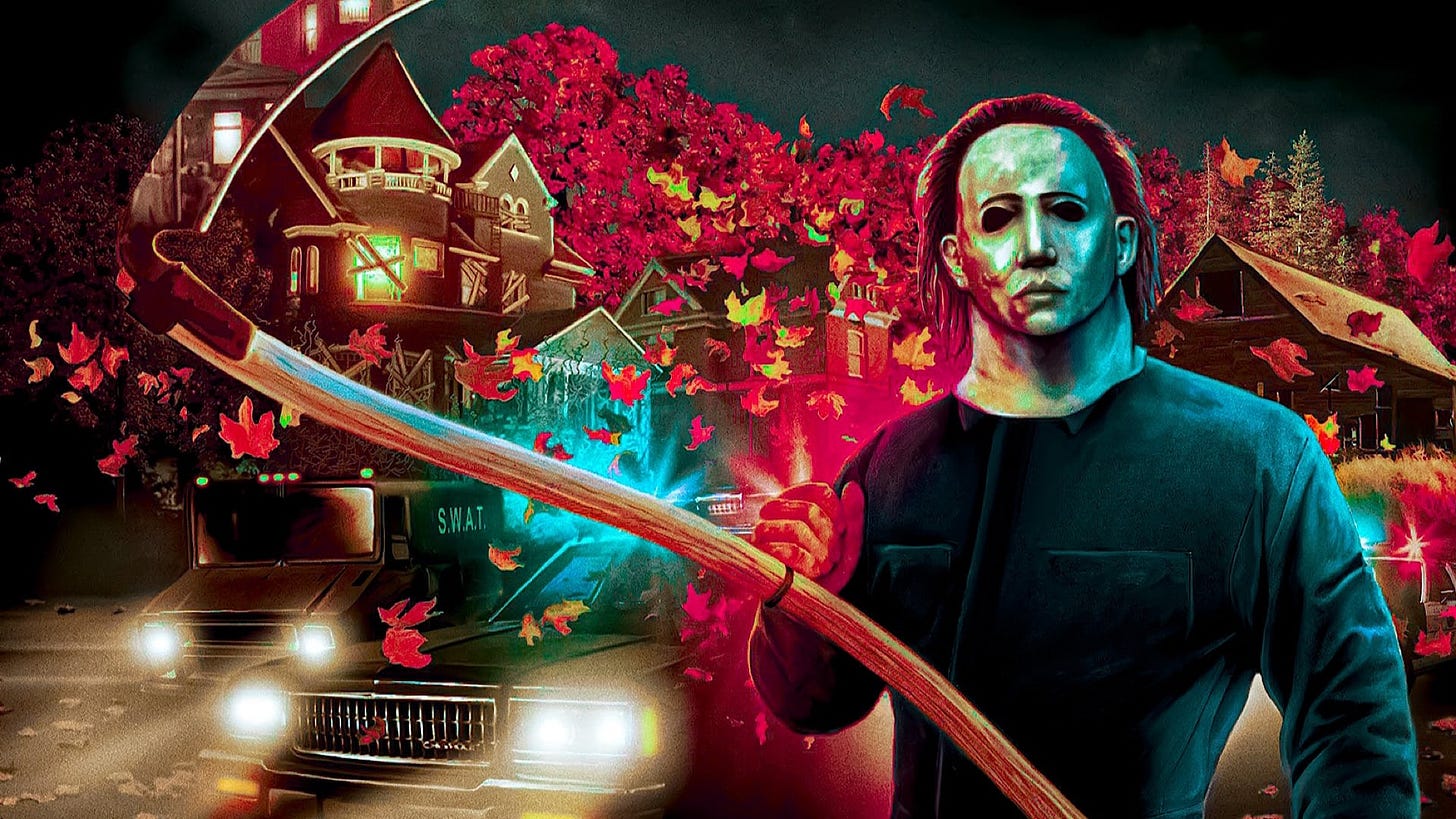
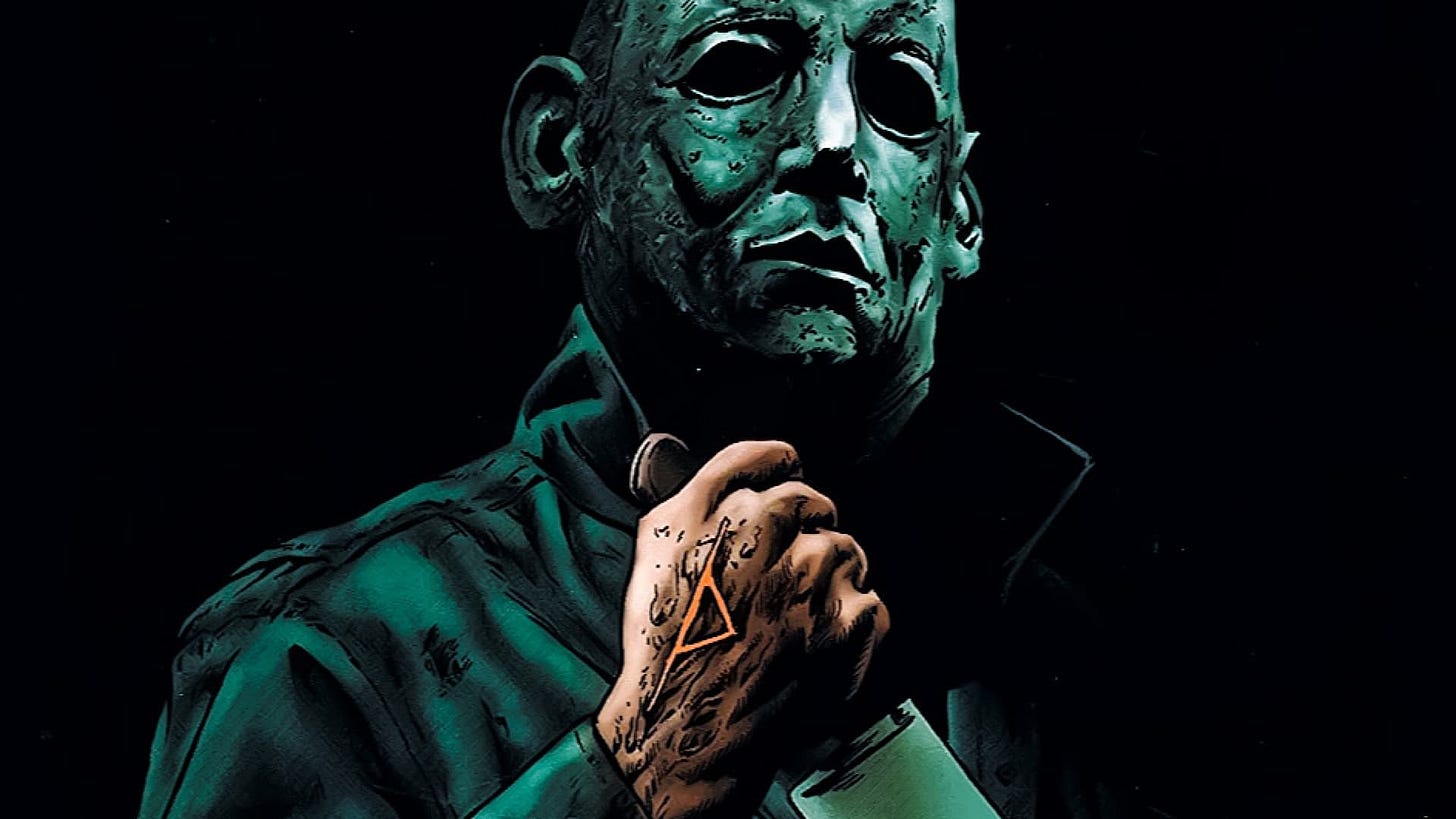

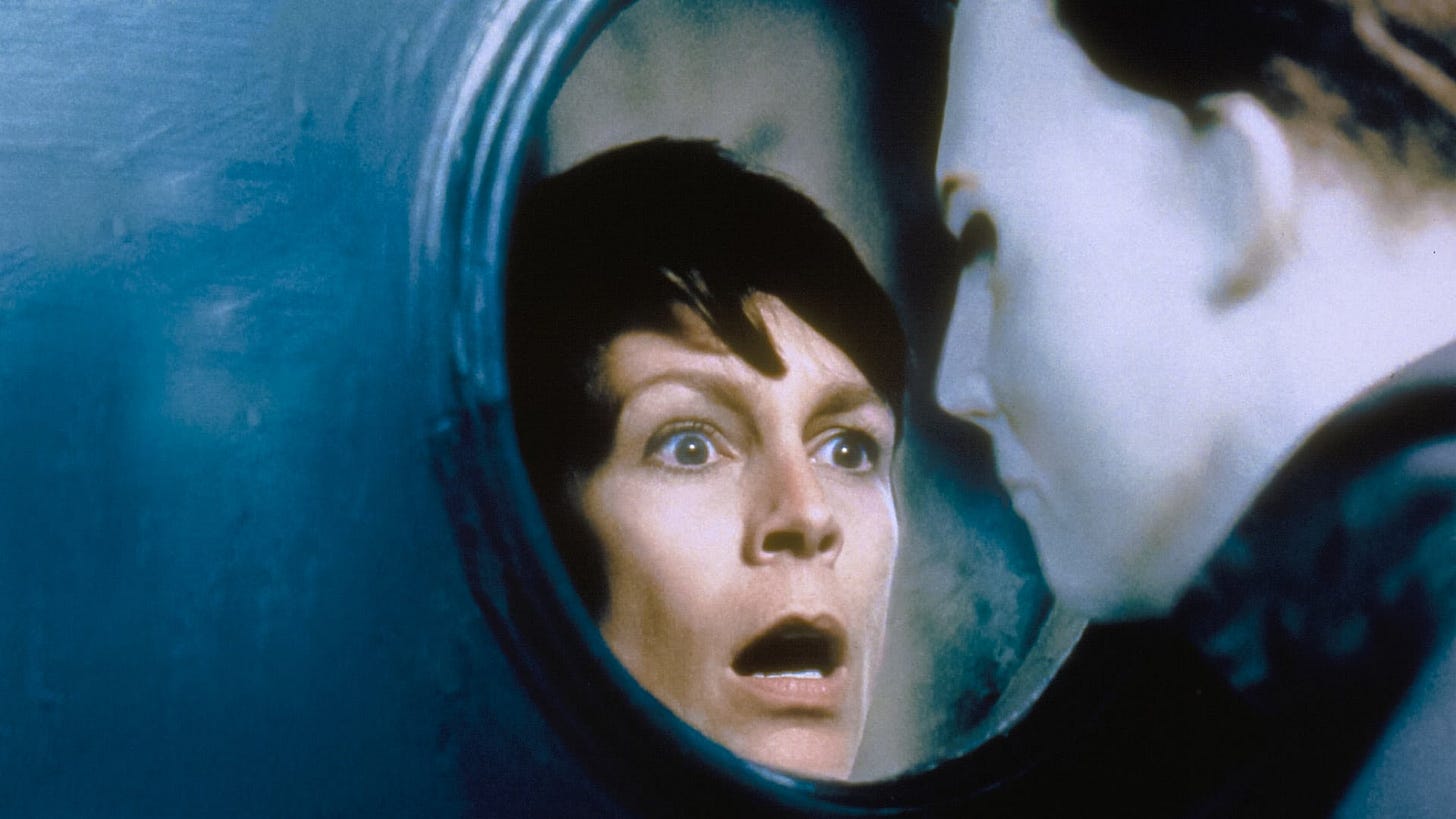
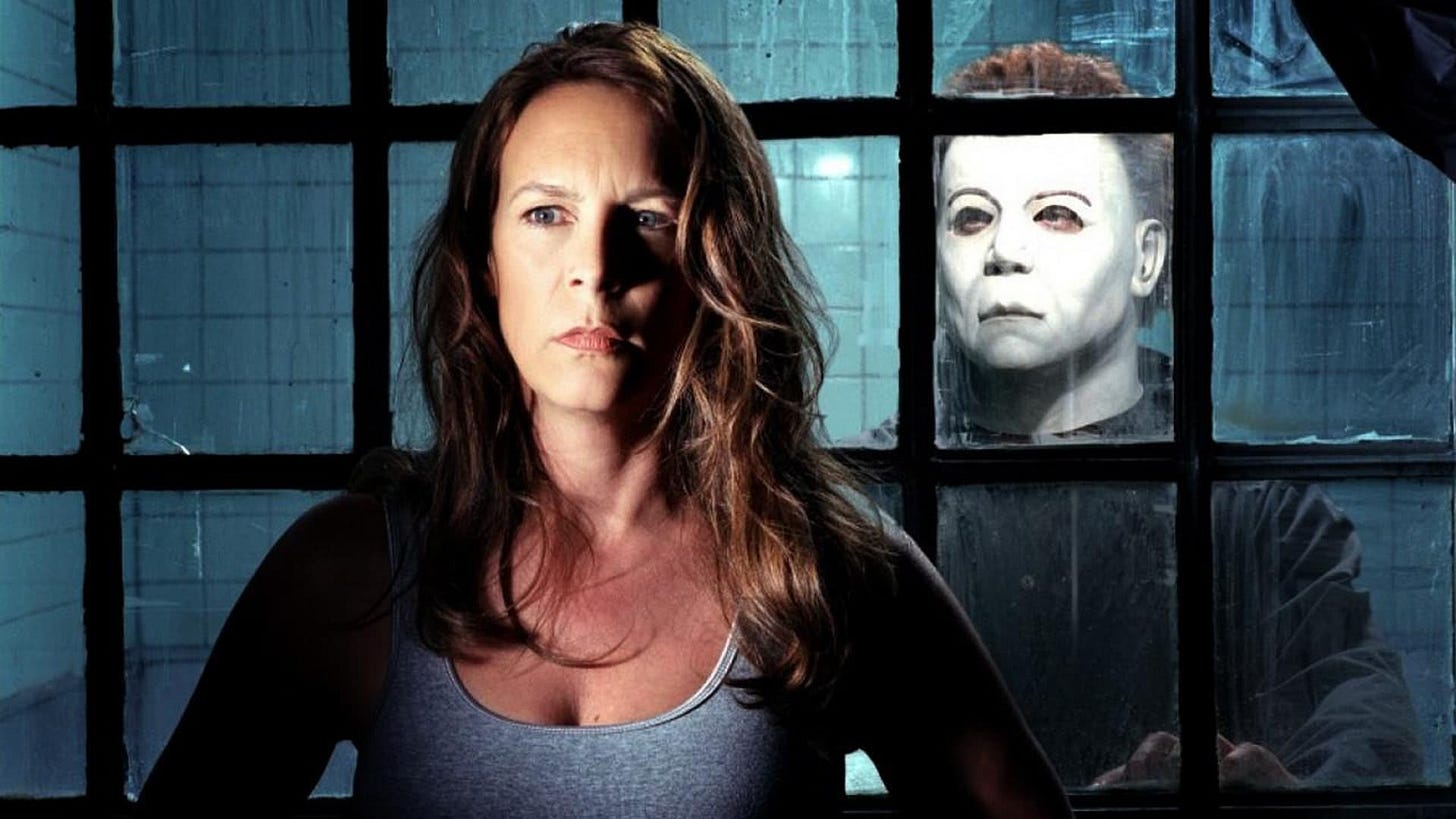
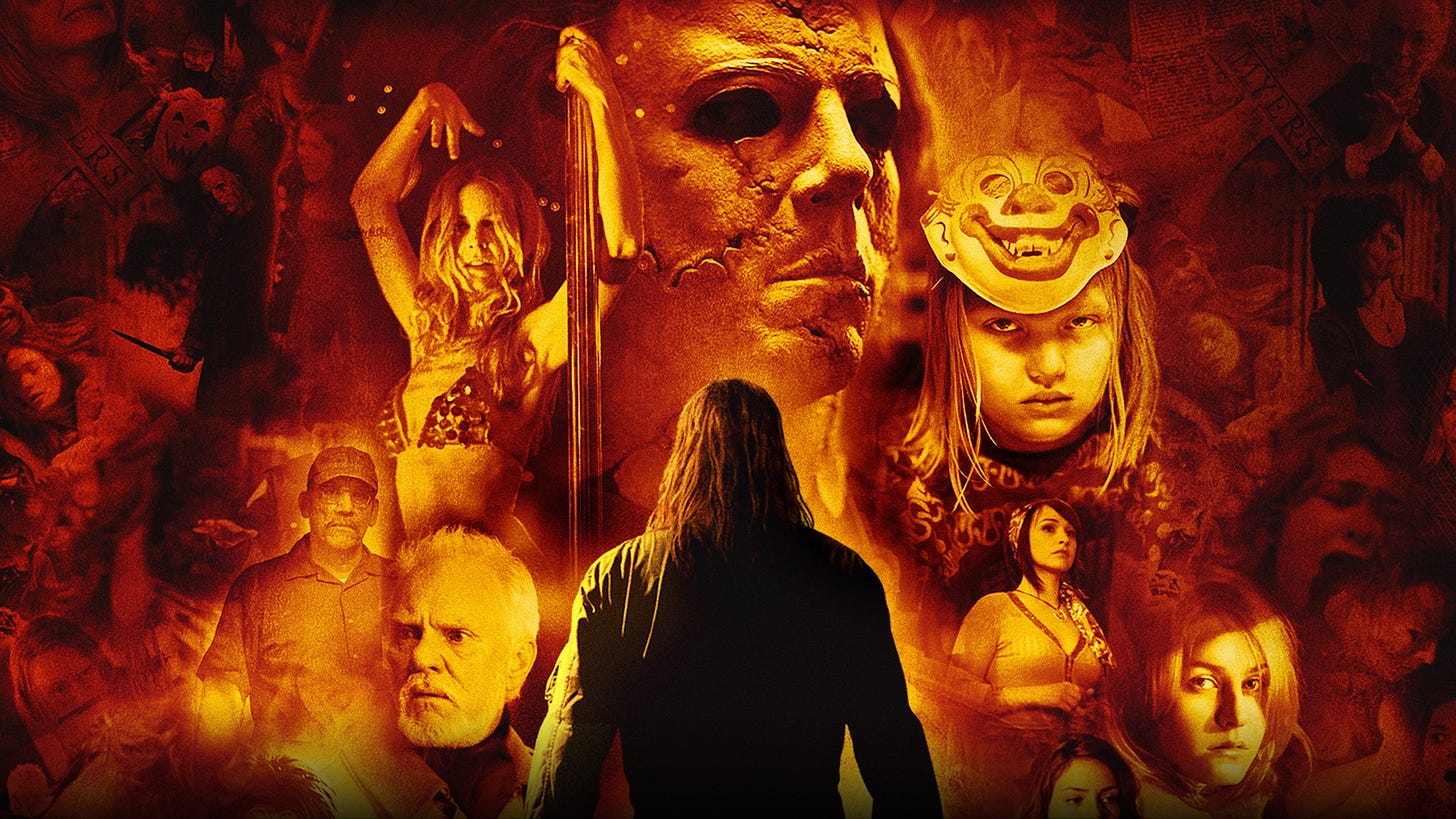
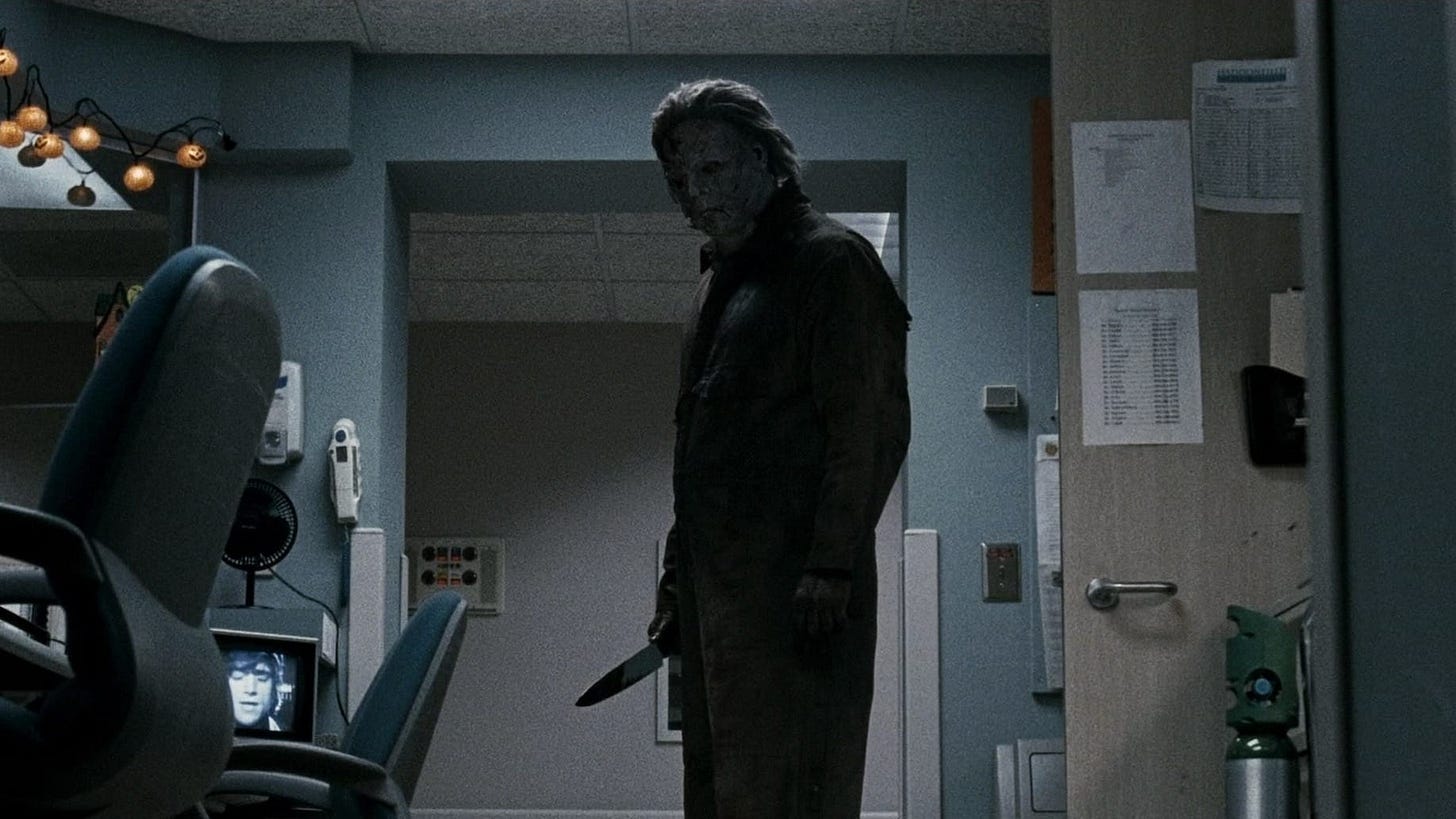
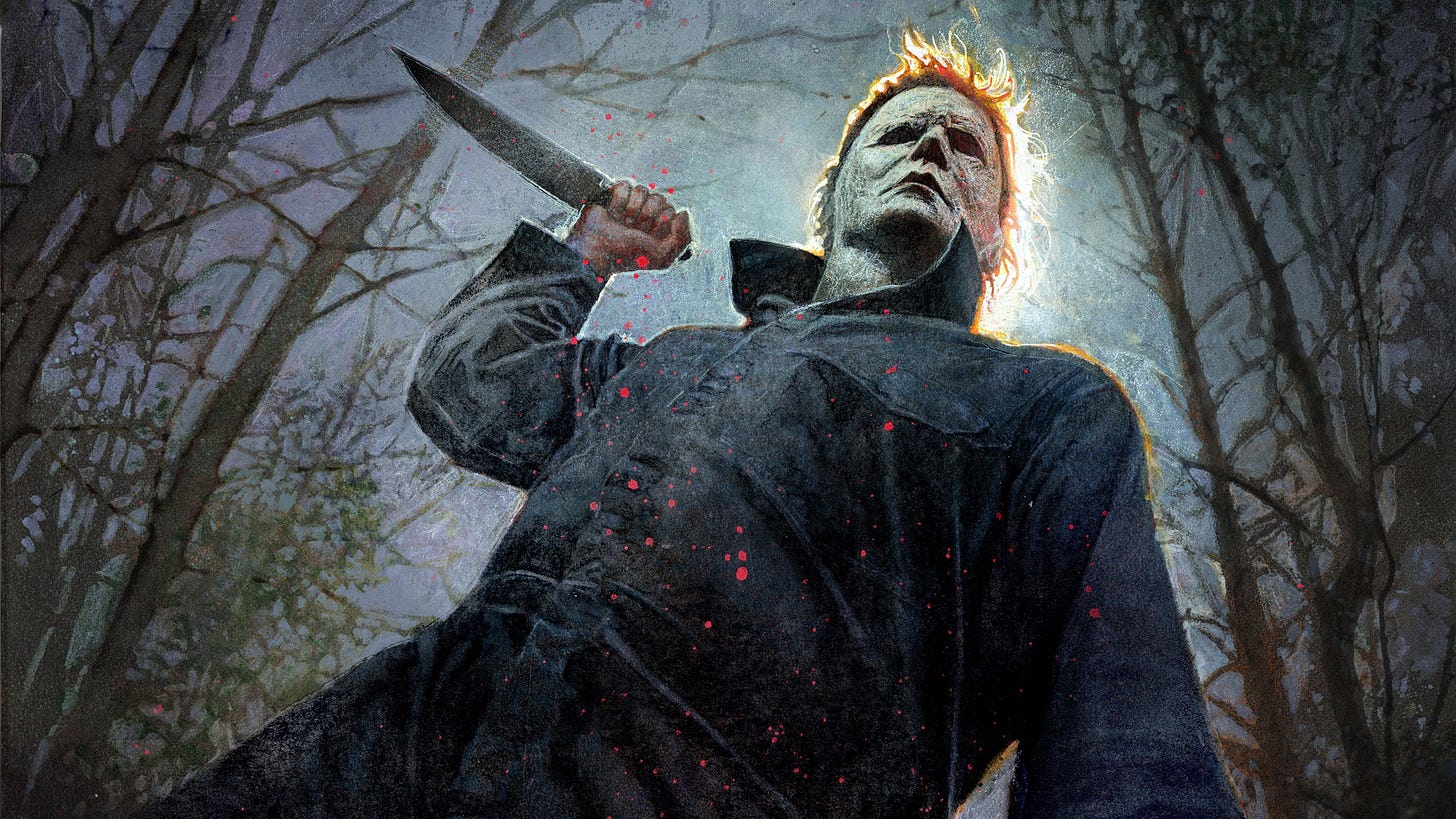
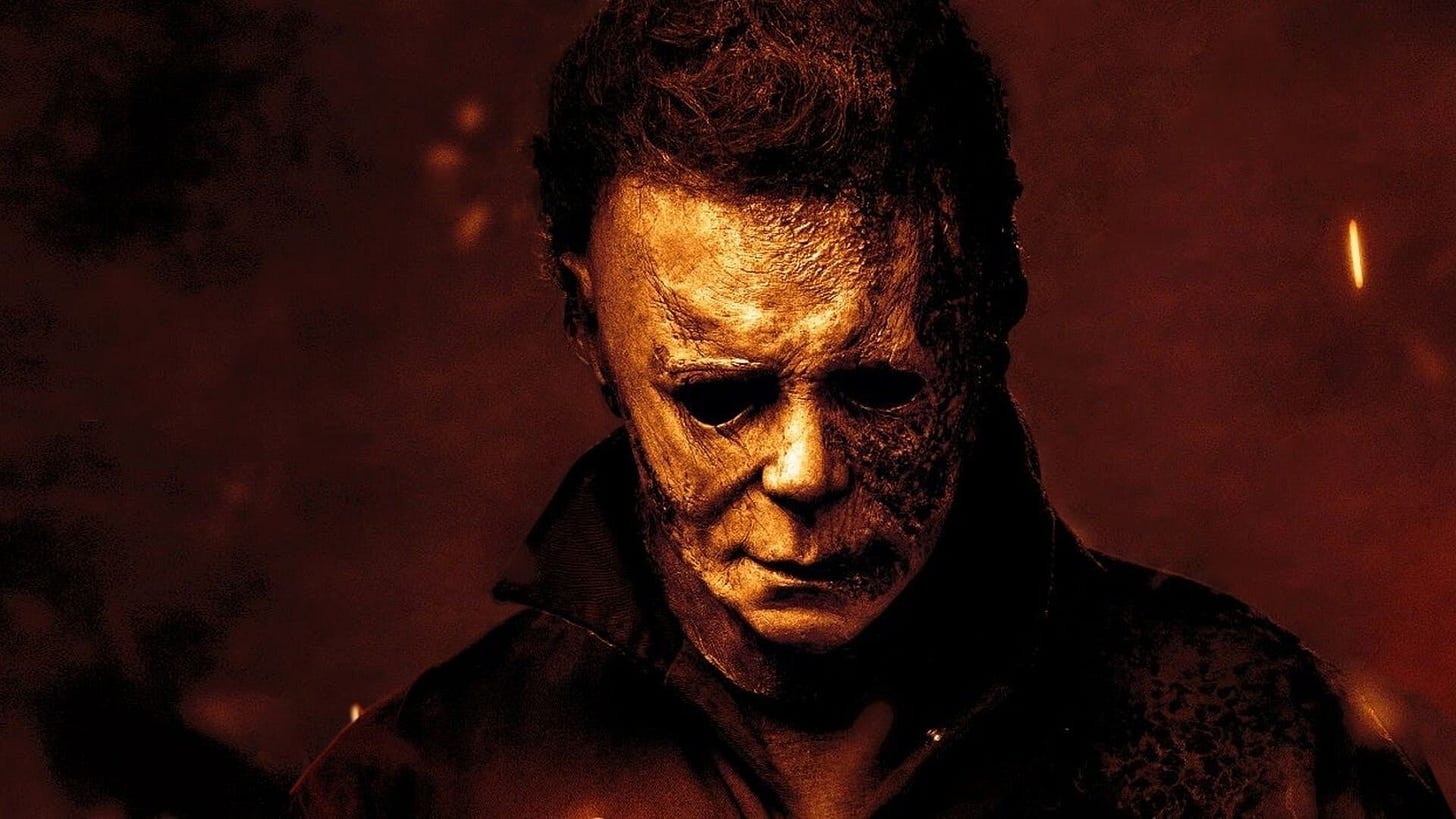
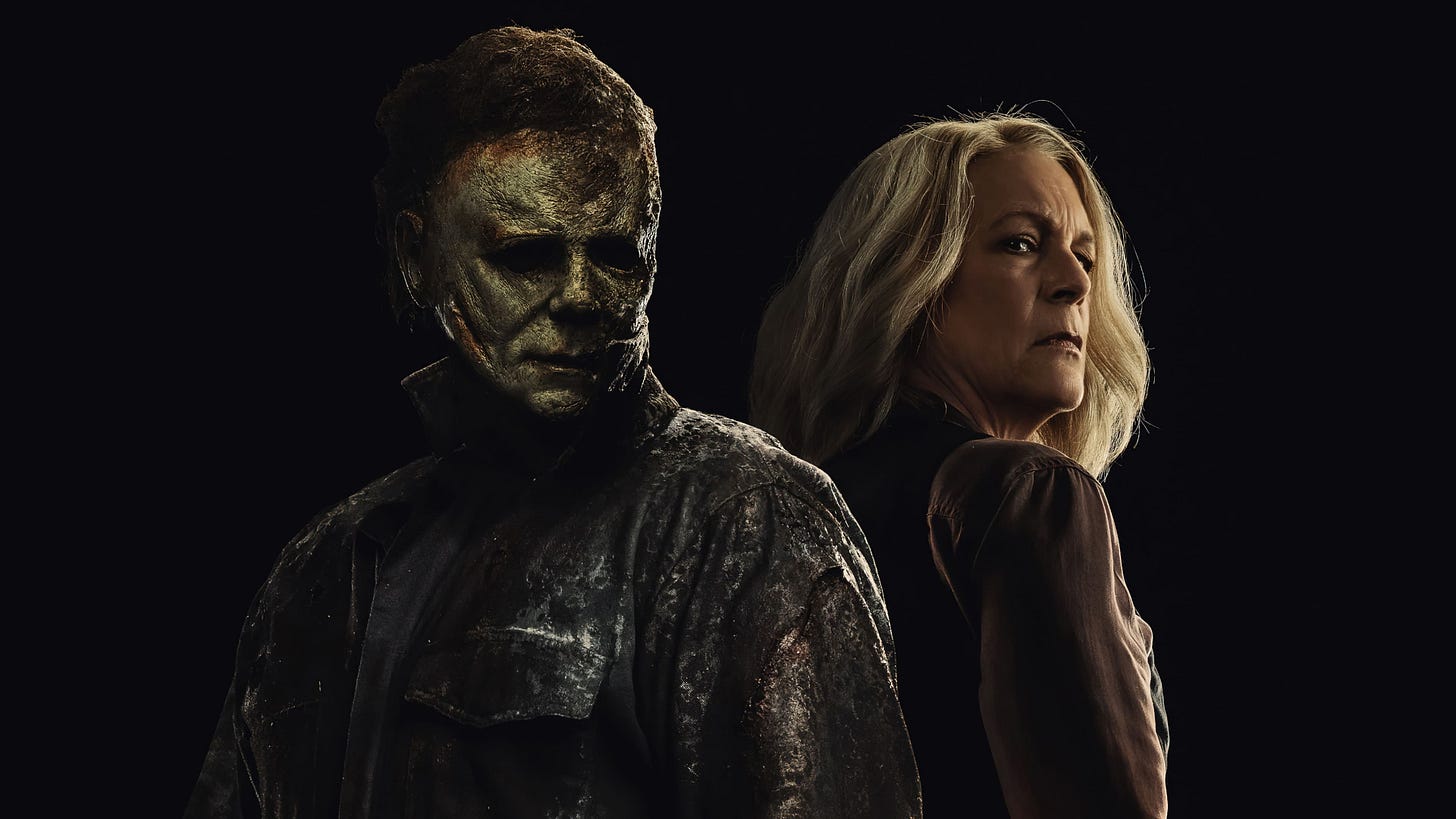
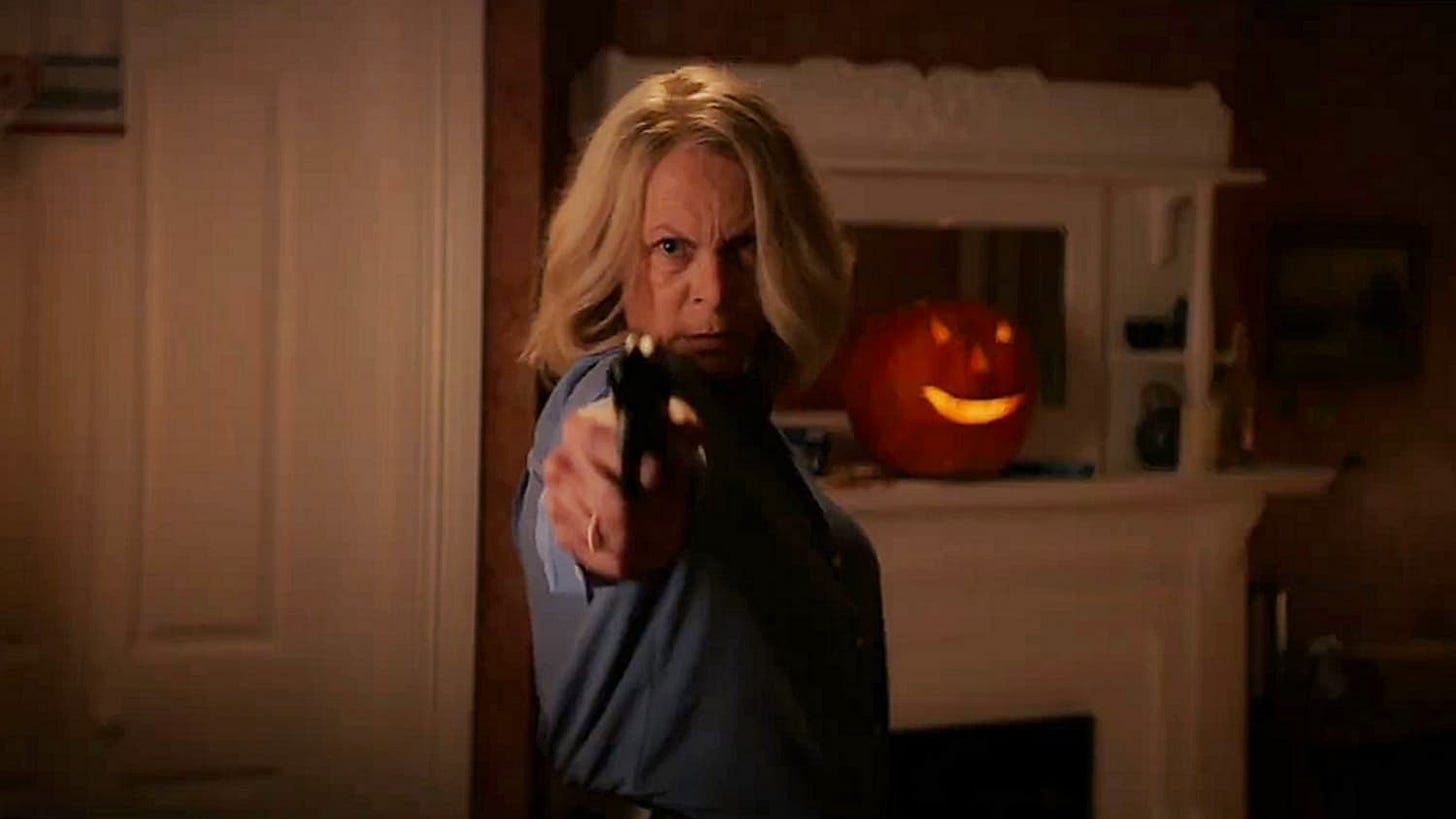
I dunno... that apocalyptic ending of Halloween Kills was really up my alley. I liked that last movie, but I feel like it definitely backpedaled from that second film, and in essence made it completely unnecessary.
Fromtheyardtotherthouse.substack.com
It’s nice to know I’m not the only one who doesn’t hate the Rob Zombie films!